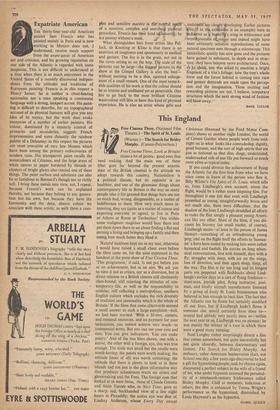This England
Free Cinema Three. (National Film Theatre.)—The Spirit of St. Louis.
(Warner.)—The Search for Bridey Murphy. (Cameo-Polytechnic.) Free Cinema Three, Look at Britain!
raises a lot of points: good ones that need makitig. And the main one of these (that goes far beyond the present anemic state of the British cinema) is the attitude we adopt towards this country. Nationalism is a political disease, but its opPosite is no healthier, and one of the gloomiest things about contemporary life in Britain is the way so many people take it for granted that things here are not so much bad, wrong, disagreeable, as a matter of indifference to them. How very much more in- teresting, they say (quite as a matter of course and expecting everyone to agree), to live in Paris or Athens or Rome or Timbuctoo! One wishes some malignant magician would hear them and put them down there to set about finding a flat and earning a living and bringing up a family and then seeing how much better they liked it.
Natural staidness kept me in my seat, otherwise I would have raised a small cheer even before the films came on, for the aims expressed in the handout at the press show of Free Cinema Three. `This programme,' it said, 'is not put before you as an achievement, but as an aim. We ask you to view it not as critics, nor as a diversion, but in direct relation to a British cinema still obstinately class-bound; still rejecting the stimulus of con- temporary life, as well as the' responsibility to criticise; still reflecting a metropolitan, southern English culture which excludes the rich diversity of tradition and personality which is the whole of Britain.' If the films that came afterwards seemed a small answer to such a large complaint—well, we had been warned. 'With a 16-mm. camera, and minimal resources, and no payment for your technicians, you cannot achieve very much—in commercial terms. But you can use your eyes and ears. You can give indications.' You can make poetry.' And of the two films shown, one with a native, the other with a foreign, eye, this was true enough. The scale was small but the results were worth having; the points were worth making; the attitude (most of all) was worth sustaining; the -attitude that there is plenty to look at in these islands and not just in the glum informative way•that produces schoolroom tracts on elvers and glovemaking and the Fens. The foreign eyes that looked at us were Swiss, those of Claude Goretta and Alain Tanner who, in Nice Time, gave us a sharp, sad, backhanded view of a few night hours in Piccadilly; the native eye was that of Lindsay Anderson, whose Every Day except Christmas (financed by the Ford Motor Com- pany) shows us another night London, the world of Covent Garden where people work from mid- night on in what looks like comradeship, dignity, good humour, and the sort of high spirits that art just as national as that dim, dingy, understated, undercooked side of our life put forward so much more often as typical today.
If one could divorce the achievement of flying the Atlantic for the first time from what we have since come to know of the person who flew it, Billy Wilder's The Spirit of St. Louis, which tells us, from Lindbergh's own account, about the flight, would be a rather more inspiring film. For throughout it one felt that even with Lindbergh presented as young, straightforwardly brave and not much else, there were difficulties; that the shadow of the later Lindbergh straddled all efforts to make the flier simply a pleasant young Ameri- can like any other. Most of the time, if you dis- count his bravery (no small matter, of course), Lindbergh seems—at least in the person of James Stewart—something of an attitudinising young Prig; and on the flight itself the efforts to 'human- ise' a hero have ended by making him seem rather hysterical and foolish. He carries on long whim- sical conversations, first with himself, then with a fly; struggles with sleep, with ice on the wings, loss of direction, and then again sleep, sleep, all the way. The film is far too long and its longest parts are peppered with flashbacks about Lind- bergh's earlier days as a sort of flying freelance- stunt-man, joyride pilot, flying instructor, post- man, and finally aircraft manufacturer financed by a group of lively St. Louis businessmen who believed in him enough to back him. The fact that the Atlantic can be flown has certainly modified all our lives, but if Lindbergh hadn't flown it someone else would certainly have done so— several had already very nearly done so—within the next year or so. Lindbergh was no pioneer; he was merely the winner of a race in which there were a good many running.
Noel Langley rather surprisingly directs a film that comes somewhere, not quite successfully but not q'uite absurdly, between documentary and fantasy, The Search for Bridey Murphy. An ordinary, sober American businessman (fact, not fiction) one day a few years ago discovered he had a gift for hypnotising people; and, by chance again, discovered a perfect subject in the wife of a friend of his, who under hypnosis assumed the personal- ity of a nineteenth-century Irishwoman called Bridey Murphy. Chill at moments, ludicrous at others, thefilm is enhanced by Teresa Wright's performance as the hypnotised, diminished by Louis Hayward's as the hypnotist.
ISABEL QUIOLY










































 Previous page
Previous page